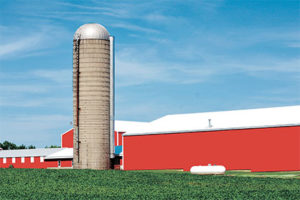GRAIN DRY Act would provide loan access for propane storage
Four members of Congress are backing bipartisan and bicameral legislation that would include propane storage under the farm storage facility loan program through the U.S. Department of Agriculture.

Photo: steverts/iStock / Getty Images Plus/Getty Images
U.S. Reps. Brad Finstad, R-Minn., and Jim Costa, D-Calif., are sponsoring HR 1290, also known as the Growing Rural Ag Infrastructure Needs to Deliver Rising Yields (GRAIN DRY) Act. The bill would amend the Food, Conservation and Energy Act of 2008 to clarify propane storage as an eligible use for funds provided under the loan program. Finstad introduced the bill, which was referred to the House Committee on Agriculture, on March 1.
Since its inception in 2000, the loan program has provided low-interest financing so agriculture producers can build or upgrade facilities to store commodities.
According to the House leaders, the GRAIN DRY Act would expand the loan program to include propane storage, a critical tool for drying grain and heating barns, allowing agricultural producers access to the same financing for propane storage that is available for other on-farm storage facilities.
“The vast majority of grain dryers run on propane, making it a critical tool for Minnesota farmers,” Finstad says. “By opening up the program to include propane storage, we are providing farmers with the ability to stabilize their propane supply, giving them greater flexibility to lock in inputs for a commodity that has historically had supply shortages.”
Finstad introduced the House bill as a companion to SB 621, introduced March 2 by Sen. Joni Ernst, R-Iowa, and cosponsored by Sen. Amy Klobuchar, D-Minn. The Senate bill was read twice and referred to the Committee on Agriculture, Nutrition and Forestry.
Propane storage does not qualify as an expense to be covered under the loan program, even though more than 80 percent of grain dryers run on propane, according to Ernst.
“Iowa farmers have felt the pressure in recent years with late planting seasons and cold snaps, bringing an increased need for propane to dry grain and to keep their livestock warm,” Ernst says. “Day-to-day operations are directly tied to propane supply, and this bill gives our farmers access to additional capital for storage, avoiding uncertainty and disruption next harvest.”
Ernst says the legislation is supported by Iowa agriculture leaders, including Iowa Department of Agriculture Secretary Mike Naig.
“More storage gives farmers and rural residents the opportunity to lock in their propane supply when prices are more affordable and availability is more predictable,” says Naig, adding how he hears about the issue regularly in his travels across the state.
The National Propane Gas Association (NPGA) says it worked closely with the legislators to identify opportunities within the upcoming Farm Bill to expand access to propane storage for agriculture producers. The current Farm Bill expires Sept. 30, and the House and Senate agriculture committees are beginning to identify priorities to include in the legislation.
“By codifying propane’s place in the [loan] program and allowing all agriculture producers to benefit from low-interest loans for propane storage, Congress will be taking an important step to alleviate constraints our industry and consumers face during delayed and/or wet harvest seasons,” Andrew Healey, senior manager of legislative affairs at NPGA, shares with LP Gas. “As we have learned, late or wet harvests, like in 2013-14, can cause numerous disruptions for the entire propane supply chain. By reducing and removing barriers to storage for agriculture producers specifically, and rural areas generally, all propane consumers can benefit.”
















